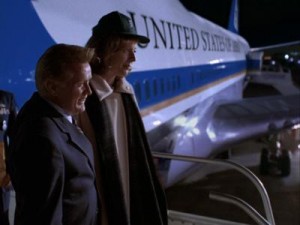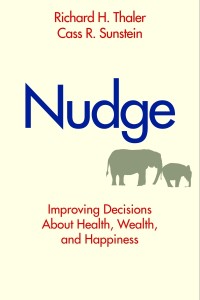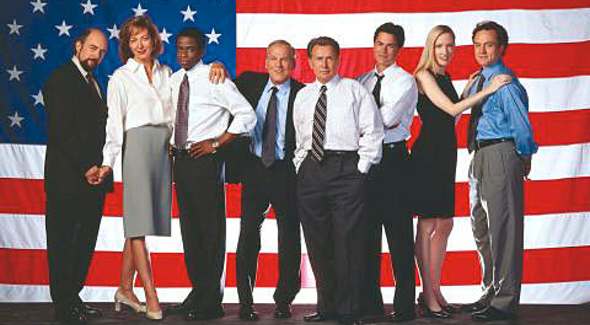The Portland Trip
C.J. joins the President on a flight to Portland after a wisecrack about Notre Dame; Josh seeks to defeat an anti-gay marriage bill; Sam wants to rewrite an education speech; an oil tanker appears to be violating UN sanctions; Josh teases Donna over her dating record. (c/o IMDb)
Oil sanctions in Iraq and gay marriage – a plot that could be ripped from today’s headlines. Say what you will about The West Wing, you can’t say it’s not timely.

Bartlet and all the staff save Josh and Leo embark on a flight of fancy, literal and figurative, across the U.S. at night. Bartlet tries to inspire the staff to come up with imaginative ideas to common problems, using the imagery of a nighttime transcontinental flight as a metaphor. That’s Bartlet’s job: to be the ideologue and visionary. It’s the job of his staff to turn his visions into reality.
Sam’s very concerned about policy in this episode. He’s frustrated that the President’s new education initiative is weak and uninspiring. He insists on revising the President’s speech several times, leading C.J. to make the embarrassing request of asking to get it back from the Press Corps. Danny asks if this is because of changes in policy. It’s not – at least, not initially – but that’s the appearance it creates. Last episode, we saw how process and image were two parts of the political tripod. Here, we see how they feed into each other: Sam’s concerns over image turn into changes in policy.
Sam’s ideology also informs image, as he tries to sneak the phrase “permanent revolution” into the President’s education speech.
TOBY
Where have I heard that?SAM
Permanent revolution?TOBY
Yeah.SAM
I got it from a book.TOBY
What book?SAM
The Little Red Book.TOBY
You think we should quote Mao Tse-tung?SAM
We do need a permanent revolution.TOBY
Still, I think we’ll stay away from quoting Communists.SAM
You think a Communist never wrote an elegant phrase?TOBY
Sam…SAM
How do you think they got everyone to be Communist?
While Sam’s not a doctrinaire Communist, he obviously read Mao’s Little Red Book and found parts of it memorable enough. He seizes on the phrase and grills Toby: why can’t education be a revolutionary idea in the U.S.? Ideology informs image.
(Meanwhile, in the conservative alternate universe The West Wing, White House Deputy Communications Director Dan Dearborn tries to sneak the phrase “moochers of the spirit” into a speech, only for his boss to recognize it as a line from Atlas Shrugged. “You want to quote the most famous American atheist of the Twentieth Century at the National Prayer Breakfast?” he asks. “Gotta admit,” Dearborn says, “the line sticks with you.”)
Back on the humble ground, Josh spars with an old friend of his, a Republican Congressman who’s backing the GOP on a bill that defines marriage as a union between a man and a woman. Josh throws out one objection after another, but can’t breach the Congressman’s smooth rhetoric. Finally, he cracks, asking the question that’s been on his mind the whole evening: “How can you be a member of this party?!? […] This party who says that who you are is against the law.”
(“You’ve been holding that in way too long,” the Congressman remarks. As a writing device, this is pretty weak: forestalling an obvious conflict just to fill out a narrative arc.)
But Congressman Skinner goes on to explain how he can be a member of a party that doesn’t consider him enough of a human being to deserve marriage recognition:
I agree with 95% of the Republican platform. I believe in local government. I’m in favor of individual rights rather than group rights. I believe free markets lead to free people and that the country needs a strong national defense. My life doesn’t have to be about being a homosexual. It doesn’t have to be entirely about that.
As I mentioned in reviewing the last episode: so long as you have ideology, you’re not a villain on The West Wing. So long as you don’t sell out entirely to the games-playing or the sound bites, it doesn’t matter what you believe. Skinner believes in the GOP platform. He believes in it enough that he’ll stand by his party even as they vote to obstruct his right to marry whom he wants. What’s the alternative – cross the aisle to side with a party where he only agrees with one issue? It’s a hard choice, sure, but it’s the choice anyone makes when they play politics.
Politics requires compromise. I’d be willing to bet a fiery ideologue like Sam opposed oil sanctions on Iraq, knowing that the populace would bear the brunt of the economic harm. I’d also be willing to bet an idealist like Toby wasn’t keen on America’s cozy relationship with Bahrain (where Leo says the Navy plans to divert the captured oil tanker). We don’t see any of those conflicts this episode, though. Ideology is not an obstacle to politics: it’s an accelerant. Ideology informs image (“permanent revolution”), image informs policy (college incentives for teachers) and policy informs ideology (put the right incentives in place and good things can happen!).
This is the brand of managerial liberalism that Richard Thaler and Cass Sunstein (currently President Obama’s Information and Regulatory Affairs czar) proposed in Nudge: Improving Decisions About Health, Wealth and Happiness. Thaler and Sunstein describe the proposed policies in this book as “libertarian paternalism”: leaving people’s freedom to choose untouched, while simultaneously arranging the available choices in such a way as to direct people toward what’s healthier. Examples include posting calorie information in restaurant menus, or creating tuition incentives for students who pledge to teach in underserved schools (as Charlie proposes in this episode).

Libertarian paternalism is a textbook example of the blending of ideology, policy and image. It arises from the belief that people’s lives can be made better, while at the same time respecting their freedom to choose. The policies are all delicate balances of psychology, incentives and timing. And everything is phrased in such a way as to be as inoffensive as possible. It’s a pronounced change from the culture wars that dominate the headlines (like gay marriage) or the blunt application of military force (like oil sanctions).
I mentioned Bartlet’s lack of character flaws when analyzing the first two episodes and some folks pointed out his love of Notre Dame. That’s not a character flaw; that’s a comic quirk. Sure, he makes C.J. wear a goofy hat, but he doesn’t exhibit poor behavior. It’s thrown off for a laugh. I’d find him – or any of the White House – easier to swallow if they had something wrong with them. And not in the job interview sense of a character flaw: “Sam’s problem is that he believes too much.” I want Josh to be lazier, Toby to be more paranoid, and C.J. to snap back when the men in her life think it’s cute to tease her. And while I love Leo, I’d prefer him as an actual drunk to a recovering one.

I’d forgotten about the idea of a sneaky return vote on the test ban treaty. What’s interesting about that I recently rewatched season 6, and they do pretty much exactly the same kind of thing on a stem cell bill, and the show portrays it as unambiguously positive; not just a nice bit of stragaem, but as genuinely noble, too. Then again, Sorkin was long gone by then.
Au contraire: being a Notre Dame fan is entirely a character flaw
You’ll find no argument from me about how one of the most average programs in college football consistently ranks in the top 20, and the legerdemain that must be necessary for that to happen.
Haven’t you heard John? This is the year Notre Dame is back! (And this time its for real. Really. Not like all those other times, like last year and the year before that, and the year before that…)
For comparison, I would strongly recommend the BBC series “The Thick Of It”, maybe starting with the semi-spinoff TV movie about the shenanigans leading to the 2003 Iraq war “In The Loop.” It’s not only hilarious, it could, horrifyingly, be closer to reality than the West Wing.
The amazing last two episodes peak with a really amazing performance by Peter Capaldi as Malcolm Tucker.
I’ve been craving more of it for years, and finally there’s a new series being filmed now if the rumors are true.
I loved In The Loop. I consider it one of the two dark comedies of the 21st century that can rival Dr. Strangelove in its bleakness (Four Lions is the other).
I’ll obviously add to the love of In The Loop and indeed anything associated with Chris Addison or Armando Ianucci, what I found so weird about The Thick of It is how much I wanted the characters to succeed – not just Hugh, who is mostly sympathetic, but even Malcolm, despite being inspired by one of the architects of the war and so on. My favourite character is probably Peter Mannion, who equivalents – 80s Conservatives still involved in government are definitely not my favourite people.
This is a condition that also appears when watching Michael Sheen in the Tony Blair trilogy.
For British politics at least, incompetence will always be more authentic than compromise.
Most West Wing episodes have a central theme and the sub plots all evidence that theme. I never figured out how the knife related to the theme of freeing things in the Shibboleth episode.